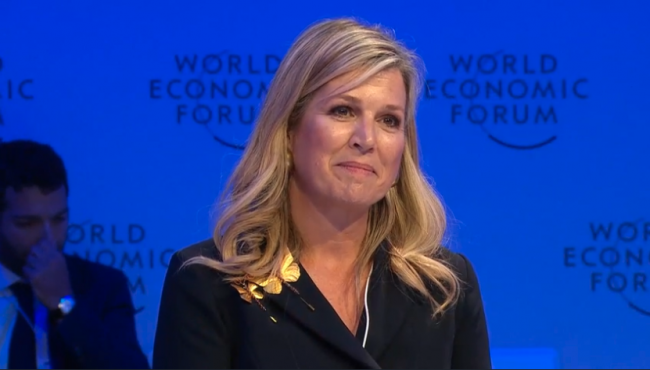
H.M. Queen Máxima of the Netherlands, the United Nations Secretary-General’s Special Advocate for Inclusive Finance for Development (UNSGSA), provided this address on the importance of digital and financial inclusion at the EDISON Alliance's "Unlocking Capital at Scale for Digital Inclusion" during the World Economic Forum (WEF) Davos Meetings on 24 May 2022.
(Note to media: Check final speech quotes against delivery. Click here to view the full session).
---
Ladies and gentlemen,
It is a pleasure to join you for this important discussion on unlocking capital at scale for digital inclusion and to share my voice of support as a champion of the EDISON Alliance.
Public and private sector financing is our best chance to mobilize the vast resources needed to provide affordable, accessible, and safe digital connections for everyone — especially the nearly 3 billion people still offline.
This includes the poor, women, smallholder farmers, and MSMEs.
The pandemic sapped their resources and made it even more expensive to get connected. New data shows that for the first time in years, fewer — not more — women are using mobile internet.
Many had to choose between owning a mobile phone and putting food on the table.
To avoid a growing digital divide and achieve universal digital inclusion, the public and private sectors need to work — and invest — together.
The EDISON Alliance can make a real difference. Its goal of improving 1 billion lives through digital solutions in health, finance, and education by 2025 is the call to action we need.
Already, the public commitments from government and industry are very encouraging. So are the tools and products being created to make these commitments a reality.
We can put in place the necessary public goods that can unleash inclusive digital financial services. On the digital financial inclusion front, we need not only digital inclusion, but a set of public goods that together will assure inclusion, stability and business sustainability.
Too often, the digital infrastructure and policies are considered in separate silos. But really, these public goods work best together.
Some unlock digital access by expanding connectivity and agent networks into new areas. Others make markets work better for customers through fair competition and interoperable payment systems. And some protect the financial system and its users by strengthening data privacy, cybersecurity, consumer protection, and digital and financial literacy.
Some will be provided by government and others by the private sector, but most require a collective effort to ensure they work for everyone.
One example is interoperable payment systems that work for the poor. Systems that support high numbers of small-value transactions are unlikely to be developed without government encouragement and support. But when they are, it is worth the investment.
Pro-poor payment systems, such as those set up in Pakistan, exemplify this. They can increase competition between providers, drive down costs, allow infrastructure to be shared between competing firms, and open the financial system to potentially millions of new customers.
For the private sector, this means serving a bigger market, and this will entail other types of products and services. This of course challenges and innovates their existing business models.
This also means that they need a seat at the table to help build fair governance structures, rules and set pricing that makes sense to all stakeholders.
Another example is connectivity and, here, reaching the last mile can be the longest mile. Connecting and serving the poor in rural and remote areas — affordably — can only be achieved through collaboration.
But what are the models of cooperation that enable the last mile clients to get digitally connected? What are the types of regulation and the right incentives for the private sector to invest and serve this last mile? And we must not forget connectivity also means ensuring access to devices too.
To build all of these vital digital public goods, we should start with dialogue. When countries share their knowledge and experiences, they can learn what works — such as Brazil’s PIX interoperable payments system or India’s digital ID system.
There are many other examples. These don’t just come from big countries with large economies of scale. For example, Peru and Estonia provide excellent case studies of small nations who have created robust and inclusive digital public goods.
Global organizations can help bring governments and the private sector together.
The World Economic Forum, UNDP, and Bank for International Settlements can all facilitate discussion and exchange on global public goods. The Gates Foundation and World Bank Group are ready to provide capital and technical assist.
Now is the time to make investments in digital infrastructure, create enabling policies, and support innovative technologies. If we do, we can build a more resilient, equitable, and trusted digital economy and financial system for all.
I look forward to supporting you on this journey to a more digitally inclusive world.
Thank you very much and I wish you all success.